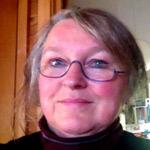
…as Hamlet said to Horatio.
Ever have the feeling that time has stopped?
The past couple of weeks have felt like that; not unlike the time of the Port Arthur massacre, or the destruction of the Twin Towers, but much more so. This is global. Everything is grinding to a halt: factories, cultural events, travel, even church services. (My church is Zooming!)
It’s surreal. Weird. Strange.
A tiny microscopic particle now seems to rule the world. Sneaking and slipping across borders, through the skies, it lurks silent and unseen, waiting to strike.
There’s lots of photos of the corona virus on the web. Super magnified, the images are intriguing. The round blob with its spikey coronet looks quite beautiful in the colour-enhanced photos. Beautiful but deadly.
How do we behave in this disjointed time? Some behaviour is disturbing.
Seems to me that people divide into three kinds: Those who panic. Those who plan. Those who plod away.
Most conspicuous are the panickers. Like Henny Penny, they rush about saying the sky is falling, the end is nigh. As Australian bush poet John O'Brien wrote, ‘We’ll all be rooned,’ said Hanrahan, ‘Before the year is out.’
Panickers are hoarding loo paper and food, and medications they’ll never use. Elderly folk are pushed and shoved in the supermarkets. Checkout staff are abused. A child was trampled underfoot last week – and ignored – in a supermarket doorway as people rushed inside to plunder the shelves.
Blinded by fear and rumours, people seek some sense of control over their circumstances. They behave irrationally – they just want to get away, escape from this dis-ease, to feel safe. ‘Make it stop! Make it stop!’
The planners are more measured in their approach. They check facts, see what is needed. Their prime concern is the safety of themselves and their own family. They probably have a secure nest egg, and a well-stocked larder, and their cars are fuelled up and ready to escape to the hills or the coast – to a bolthole where they can hunker down until the crisis has passed.
The third kind of person is what I call the plodder. The plodder observes the situation more calmly but is less concerned about their own welfare and survival and hoarding resources to protect their own. The plodder’s first thought is for their community. The plodders are the ones who look out for the lonely, the homeless, the elderly, the invalid. They are the ones slipping notes into neighbours’ letterboxes offering help with shopping, transport or just a chat on the phone.
So how should we – as Christ’s people – act?
Plagues and pestilence have swept the world for eons. In ancient times the wealthy could escape from the infested towns to their estates in the countryside. They could hide away from the diseased and infectious who were mostly the poorest and lowliest of people. There was no social security or charity in ancient Rome or Egypt, or in the cities of Europe during the times of plague and pestilence. Thousands of people died, uncared for and unable to fend for themselves.
But it was the people of faith, predominantly Christians, who cared.
In Rome, the early Christians banded together and sought to act in the name of Jesus to tend to their fellows. The actions of this fledgling body of believers eventually led to the establishment of ‘hospitalia’, set up by churches and monasteries to serve pilgrims on their journeys to the Holy Land in the Middle Ages. Many of our 21st century charitable institutions originated in this notion of ‘hospitality’ and ‘charity’.
Christians were perhaps the first ‘plodders’: not panicking, not planning just for themselves. But reacting to the circumstances and willing to put themselves in harm’s way to show God’s love and concern to others. Many of them died of the disease themselves, but knowingly and with little heed to their own safety.
They were mindful, as we should be mindful, of Paul’s words in Romans 8.
35 Who shall separate us from the love of Christ? Shall trouble or hardship or persecution or famine or nakedness or danger or sword? 36 As it is written: ‘For your sake we face death all day long; we are considered as sheep to be slaughtered.’ 37 No, in all these things we are more than conquerors through him who loved us. 38 For I am convinced that neither death nor life, neither angels nor demons, neither the present nor the future, nor any powers, 39 neither height nor depth, nor anything else in all creation, will be able to separate us from the love of God that is in Christ Jesus our Lord.
Let us be filled with love, not fear. As our Dean told us this morning in our online church prayers, God is not in quarantine. He is not isolating himself. He is with us everywhere. He’s all over this.

Sheelagh Wegman is a freelance writer and editor. She is in the community of St David’s Cathedral in Hobart and lives in the foothills of kunanyi/Mt Wellington.
Sheelagh Wegman’s previous articles may be viewed at http://www.pressserviceinternational.org/sheelagh-wegman.html